Ranking The 4 Greatest Lakers Centers Of All Time: Kareem Abdul-Jabbar And Shaquille O'Neal Set The Standard
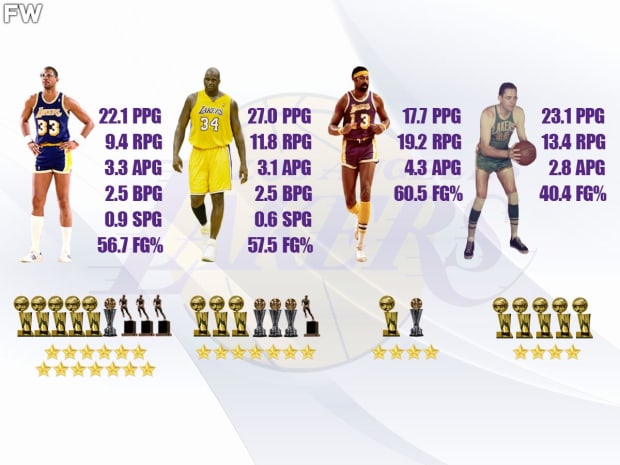
When you think of basketball royalty, teams like the Lakers and the Celtics come to mind. Both teams are tied with 17 championships a piece with the Lakers winning six since 2000. Altogether, the Lakers have made the NBA Finals 32 times. Needless to say, the Lakers have a great argument as being the league’s most historic franchise.
The Lakers have had some key figures that are responsible for the amount of success the franchise has had. These figures include Hall of Fame players and legendary coaches. These four particular players stand above the rest. These players are so great that we even had to bump out Kobe Bryant. These players set the standard for greatness.
4. George Mikan
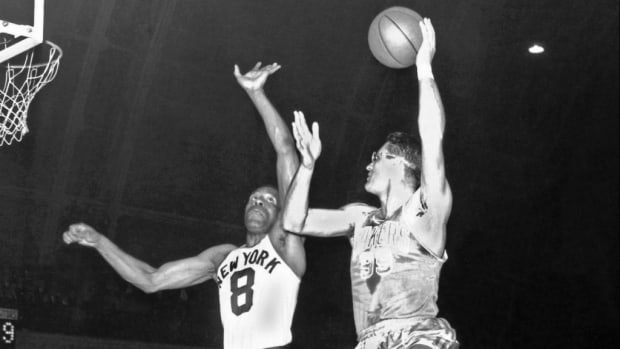
Lakers Stats: 23.1 PPG, 13.4 RPG, 2.8 APG, 40.4 FG%
Advanced Stats: 108.7 Win Share
Awards and Honors with the Lakers: 5x NBA Champion, 6x All-NBA First Team, 4x All-Star, 3x Scoring Champion, Hall Of Famer
In his first full season with the Lakers, Mikan led the league in scoring with 1,195 points. He was named the league MVP and became the only NBL player to score more than 1,000 points in a season. The following year, the Lakers and three other franchises joined the Basketball Association of America. Despite the change, it didn’t stop Mikan. He led the league in scoring by setting a single-season record and the Lakers defeated the Washington Capitals in the 1949 BAA Finals.
In 1949, the BAA and the NBL merged to form the NBA. The league featured 17 teams with the Lakers reigning in the Central Division. Mikan was dominant, scoring 27.4 points in the inaugural season, which took home the scoring title. Mikan led the Lakers to a 51-17 record and the first-ever NBA championship. Mikan averaged 31.3 points per game in the playoffs.
In 1950-1951, the NBA announced a new statistic in rebounding. Mikan stood out that season with 14.1, as well as a career-best 28.4 points per game. That year, Mikan played in one of the most notorious games in NBA history. The Fort Wayne Pistons played against the Lakers and held a 19-18 lead. The Pistons were afraid that Mikan would mount a comeback, so the Pistons passed the ball around without any attempt to score the basket. They were able to do this given there was no shot clock. Because of this, the game ended up being the lowest NBA scoring game of all time. Four years later, the shot clock was invented.
The following year, the NBA decided to widen the foul lane under the basket from six feet to 12 feet. Players could only stay in the lane for three seconds. This was later dubbed as “The Mikan Rule.” It led to a reduction in scoring from 27.4 points to 23.8. It didn’t stop him in the future though when Mikan dropped 61 points in 1952. He shined in the All-Star Game as well when he logged 26 points and 15 rebounds.
In the 1952 NBA Finals, neither team was allowed to play on their home court due to scheduling conflicts. Mikan was able to assert himself as the top overall player, where he led the Lakers to a 4-3 series win over the New York Knicks. Mikan began to slow down in 1953-1954 at the age of 29, but still averaged 18.1 points and 14.3 rebounds, leading the Lakers to their fifth championship in the sixth year. At the end of the season, Mikan retired for family purposes, but more importantly for his health. During his career, Mikan had sustained 10 broken bones and 16 stitches, often playing through injuries.
3. Wilt Chamberlain
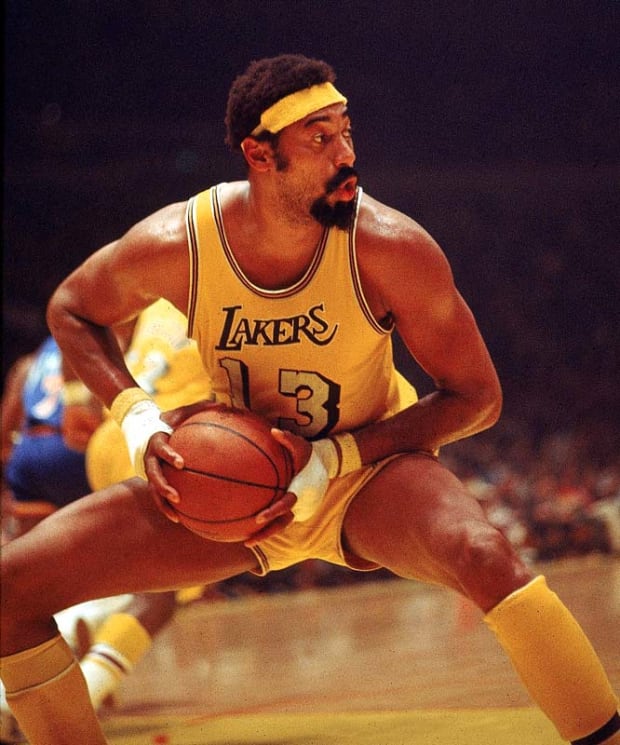
Lakers Stats: 17.7 PPG, 19.2 RPG, 4.3 APG, 60.5 FG%
Advanced Stats: 63.6 Win Share
Awards and Honors with the Lakers: 1x NBA Champion, 1x Finals MVP, 1x All-NBA Second Team, 2x NBA All-Defensive First Team, 4x All-Star, 1x Scoring Champion, Hall Of Famer
Chamberlain was already a Hall of Famer before he joined the Lakers. He just padded his illustrious career with his five years in Los Angeles. Chamberlain led the league in rebounding four of his five seasons, where he also led the league in field goal percentage three times. In his first season, Chamberlain struggled to adjust to his new team. It got so bad at one point that Chamberlain was labeled as a “choker” for scoring just eight points in Game 6 of the NBA Finals against Bill Russell and the Boston Celtics.
The following year, Chamberlain was a man on a mission when he averaged 32.2 points and 20.6 rebounds in his first nine games of the season. The Lakers marched through the playoffs to make the 1970 NBA Finals play the Knicks, led by Wills Reed and Walt Frazier. Chamberlain had some great moments, like blocking Reed’s potential go-ahead shot in Game 2. In Game 4, Chamberlain scored 18 points and grabbed 24 rebounds to help the Lakers tie the series. In Game 6, Chamberlain helped the Lakers stave off elimination with 45 points and 27 rebounds.
In the end, the Knicks were led by Reed, who hobbled up the court to score the first four points, where he inspired a 27-point halftime lead over the Lakers. Chamberlain lost his third straight Game 7 and was criticized for dominating the injured Reed. The following year, Chamberlain was bested by another great big in Kareem Abdul-Jabbar in 1971.
The next year, Elgin Baylor retired and Chamberlain accepted the role as captain. It was an all-time low in points, but he led the league in field goal percentage. In the postseason, Chamberlain got his revenge over Abdul-Jabbar. In Game 6 of the Conference Finals, Chamberlain played all 48 minutes, scored 24 points and 22 rebounds, and led the Lakers to a 104-100 win. Chamberlain won his first championship with the Lakers this season. His most impressive game was in Game 5, where he totaled 24 points, 29 rebounds, eight assists, and eight blocks en route to winning Finals MVP.
The 1972-1973 season was Chamberlain's final season in the league. Chamberlain won his 11th career rebounding title and shot an NBA record 72.7% from the field. The Lakers returned to the NBA Finals but were met by a healthy Knicks squad. The Lakers won Game 1, but lost Game 2 and 3, and Jerry West was lost to an injury. The shorthanded Lakers were bested the following two games. His final game featured another 20-20 performance, while his last play ever was a dunk with one second left.
2. Shaquille O’Neal
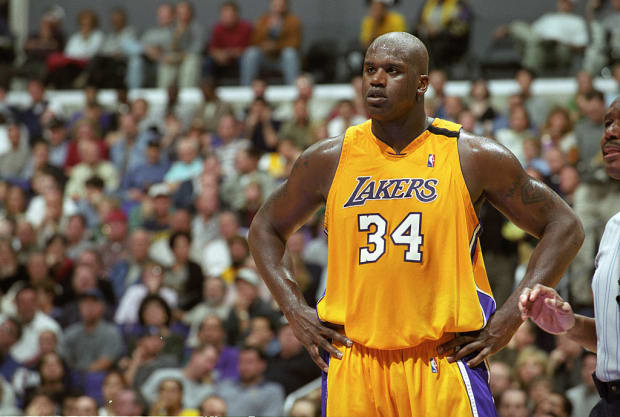
Lakers Stats: 27.0 PPG, 11.8 RPG, 3.1 APG, 2.5 BPG, 0.6 SPG, 57.5 FG%
Advanced Stats: 97.0 Win Share, 114 Offensive Rating, 99 Defensive Rating
Awards and Honors with the Lakers: 3x NBA Champion, 3x Finals MVP, 1x NBA MVP, 5x All-NBA First Team, 7x All-Star, 1x Scoring Champion, Hall Of Famer
O’Neal left the Magic after the 1995-1996 season to join the Lakers on a seven-year, $121 million contract. In his first season, he missed 30 games due to injury but came back for the playoffs. In the first round, O’Neal scored 46 points in Game 1, which was the most by an individual Laker since Jerry West. The following year, O’Neal led the league in field goal percentage, but the team was unable to make a deep playoff run. Once a young teen named Kobe Bryant came to town, the duo began to form a partnership that goes down as one of the best in NBA history.
Before the 1999-2000 season, the Lakers hired Phil Jackson, who immediately challenged O’Neal to contend for an MVP. O’Neal shined this season, including scoring a career-high 61 points along with 23 rebounds in a win over the Clippers. He was named the MVP that season, Finals MVP, and Shaq took home his first championship.
In 2001, O’Neal and Bryant began to feud, but the Lakers had a special season. The Lakers closed out the Trail Blazers and Spurs with complete sweeps. In the Conference Finals, the Spurs couldn’t put up a fight either as the Lakers completed the 11-0 sweep of the first three rounds, becoming the second team to ever do it. In the Finals, Shaq earned his second straight NBA Finals when the Lakers took down the 76ers in five games.
The three-peat was completed the following year. Shaq played through a toe injury to average 27.2 points and 10.7 rebounds. He was less of a defensive force but was an intimidating factor after having run-ins with Brad Miller and Charles Oakley. The Lakers ultimately took down the Kings in a controversial series in the Conference Finals and then decimated the Nets in the Finals as Shaq corralled his third Finals MVP.
Shaq made the Finals once again in 2004, but the team was taken down by the underdog Detroit Pistons. By the end of his Lakers career, he had the highest scoring average for a center in NBA Finals history. Had Bryant and Shaq never feuded, they might have owned more championships. Regardless, Shaq is one of the best to ever play the game even after leaving for the Heat at the season’s end.
1. Kareem Abdul-Jabbar
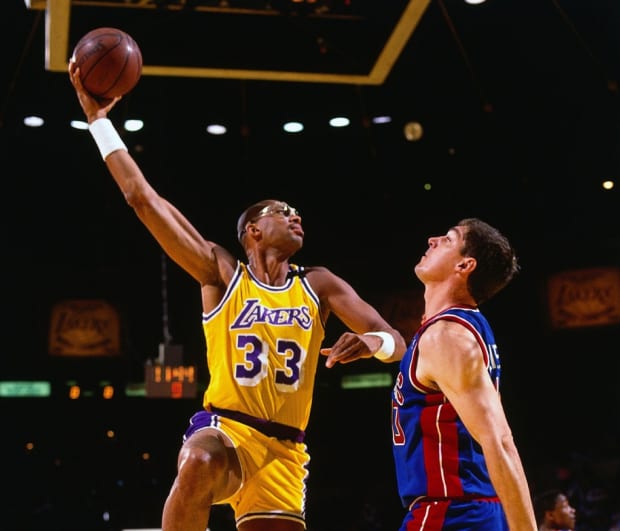
Lakers Stats: 22.1 PPG, 9.4 RPG, 3.3 APG, 2.5 BPG. 0.9 SPG, 56.7 FG%
Advanced Stats: 158.7 Win Share, 115 Offensive Rating, 101 Defensive Rating
Awards and Honors with the Lakers: 5x NBA Champion, 1x Finals MVP, 3x NBA MVP, 6x All-NBA First Team, 3x All-Defensive First Team, 13x All-Star, Hall Of Famer
After leading the Milwaukee Bucks to the 1971 championship, he was already an MVP and Finals MVP. Kareem’s legacy was already cemented in NBA history, but he wanted more. The Lakers acquired Abdul-Jabbar from the Bucks for Elmore Smith, Brian Winters, Dave Meyers, and Junior Bridgeman. In his first season, Abdul-Jabbar led the league in rebounding (16.9), block shots (4.1), and total minutes. His 1,111 defensive rebounds remain a single-season NBA record and he earned his fourth MVP. However, the Lakers missed the playoffs.
The following year, Abdul-Jabbar tied Bill Russell’s record for MVPs by earning his fifth. He led the league in field goal percentage, ranked second in rebounds, and third in scoring. In the playoffs, Bill Walton outplayed the younger Kareem and the Lakers lost to the Trail Blazers. Abdul-Jabbar’s following season was cut short with a broken right hand. The real magic, no pun intended, didn't’ start until the Lakers drafted Magic Johnson with the No. 1 overall pick in 1979.
During the 80s, Abdul-Jabbar won five more championships to finish his career with six, which also featured scoring more than 20.0 points or more in six consecutive seasons. From 1980 to his retirement in 1989, the Lakers made the NBA Finals eight times. The 1985 series against Boston was potentially the most satisfying. At the age of 38, many believed that he was washed up and that was emphasized after only 12 points and three rebounds in Game 1, dubbed as the Memorial Day Massacre.
After that, he scored 30 points, grabbed 17 rebounds, dished out eight assists, and blocked three shots in a Game 2 win and the team never looked back. Abdul-Jabbar won Finals MVP after averaging 30.2 points, 11.3 rebounds, 6.5 assists, and 2.0 blocks. It also helped wipe away any ghosts that followed him during the years he lost to the Celtics and Bill Russell.
The Lakers defeated the Celtics again in 1987 and he signed a contract to play for two more years where he would retire at the age of 42. In his final season, the Lakers returned to the Finals in a rematch against the Pistons. Abdul-Jabbar had his best outing of the entire season with 24 points and 13 rebounds in Game 3, but the team was just hit with too many injuries. Both Johnson and Byron Scott had injured hamstrings and the Pistons swept the Lakers. During the regular season, it was the first time that he shot below .500 from the field. In the end, he left the league as the greatest scorer of all time. He remains an all-time great in league history, but also the greatest to ever wear purple and gold.
Post a Comment
0 Comments